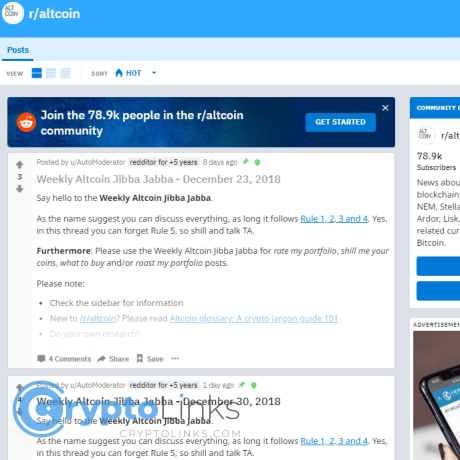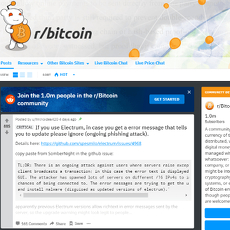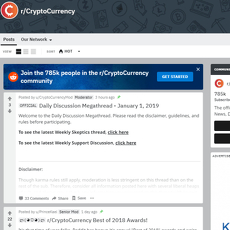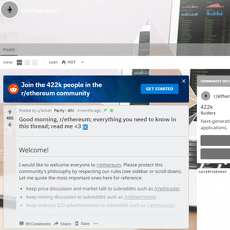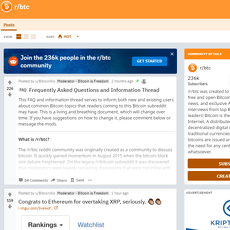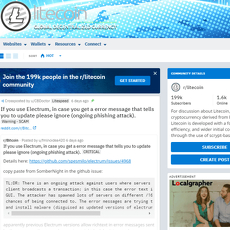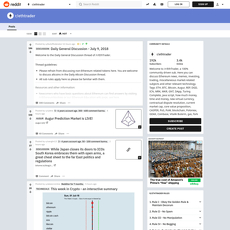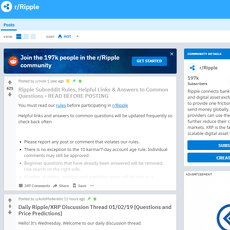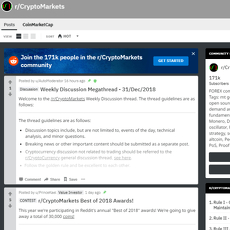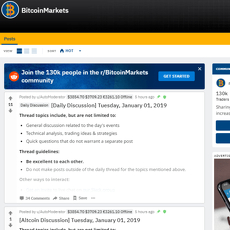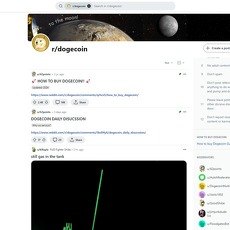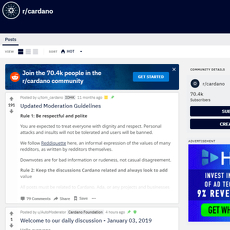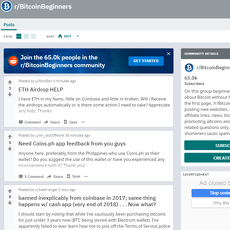r/altcoin Review
r/altcoin
www.reddit.com
r/altcoin Reddit Review & Guide: How to Use r/altcoin Without Getting Rekt [FAQ]
Ever open r/altcoin and think, “Where do I even start?” If you’re hunting for the next big narrative, new coins, or real user takes—not paid hype—this guide is for you. I’ll show you how to use r/altcoin like a pro, filter the noise, and spot useful signals, so you save time and avoid costly mistakes.
The pain: noise, shills, and time sinks
Let’s be honest: r/altcoin can feel like a firehose. On any random day you’ll see fresh tickers, “urgent” airdrops, recycled FUD, and threads that look deep but say nothing. You scroll for 20 minutes, click two links, and boom—now you’re looking at a Medium post with zero sources and a chart promising the “next Solana.”
There’s a reason this happens. Open communities attract good research and aggressive promotion. Studies of crypto pump groups have shown coordinated shilling can move thinly traded coins for short bursts before a fast dump. One well-known analysis of pump-and-dump activity found that organized shills repeatedly target low-liquidity tokens and that most “events” fade quickly after the hype window closes. Translation: it’s easy to get baited into chasing.
Here’s how that usually looks on the sub:
- Brand-new accounts pushing a single ticker across multiple threads.
- “Partnership announced!” posts with no source—just a cropped image.
- Giveaways that want you to connect a wallet or “verify” seed phrases. (Hard pass.)
- Listicles that name 10 coins with no tokenomics, no links, and no risks.
- Threads that farm engagement with vague promises like “100x before listing.”
Rule of thumb: If the pitch is “guaranteed,” the goal is your attention, not your outcome.
But buried in that noise are gems—commenters who catch stealth unlocks, people linking to audits, devs explaining a bug, or users sharing real fees and UX pain. The goal is to surface those fast and ignore the rest.
Promise: a practical way to use r/altcoin safely and effectively
My goal here is simple: show you a repeatable way to turn r/altcoin into a research tool, not a gambling hall. You’ll learn how to:
- Use the sub’s rules, flairs, and post types to filter signal from noise.
- Follow a research flow that saves time and catches obvious traps.
- Engage in a way that attracts smart answers, not spammy DMs.
- Spot red flags instantly and move on without FOMO.
Expect practical tips, specific examples, and quick checks you can run in minutes. No fluff, no “trust me bro.”
Why listen to me?
I review crypto platforms and communities every day, and patterns repeat. Posts that age well usually share sources, link audits or docs, include risks, and invite pushback. Low-quality threads lean on vague narratives, screenshots, or promises. I’ve seen users save themselves real money by catching small details—like a token’s circulating supply quietly updated in docs before a big unlock, or a “partnership” turning out to be a paid integration listed on a marketplace.
What matters isn’t knowing every new ticker—it’s knowing how to pressure-test claims fast and move on when something smells off.
What you’ll leave with
- A step-by-step playbook to use r/altcoin without wasting hours.
- Simple filters (sorts, flairs, keywords) to surface real research.
- Comment-reading tactics that reveal credibility and missing sources.
- Scam red flags you can spot in seconds.
- A quick DYOR rhythm that checks supply, unlocks, wallets, and contracts before you act.
Ready to cut through the noise? Up next, I’ll explain what r/altcoin actually is (and what it isn’t), the flairs that matter, and how moderation shapes the discussion so you can start filtering like a pro. Curious which flairs will save you the most time?
What r/altcoin is (and what it isn’t)
r/altcoin is a public square for altcoin talk across every market cap and niche—L1s, L2s, DePIN, AI, privacy, NFTs, you name it. It’s where people share news, ask hard questions, swap notes on token design, and yes, vent after a nasty red day.
What it is not: a signals channel, a “buy now” feed, or a place to crowdsource financial advice. Anyone promising quick wins or guaranteed returns is using the wrong platform—and they’re using you.
“Trust the questions, not the calls.”
If you’re here to sharpen your thinking, r/altcoin can be a goldmine. If you’re here to chase screenshots and hop into DMs, expect to get burned.
Rules, flairs, and typical post types
Flairs are how this subreddit stays navigable. When you sort by flair, you control your feed and your time. Here’s what you’ll usually see (names can vary slightly, but the patterns are consistent):
- Discussion — Open-ended debates about narratives, catalysts, risks, or governance.
Sample: “Is restaking actually compressing risk into LSTs, or is this just Twitter fear?” - News — Headlines with a link and a quick summary. Quality posts add context, not just a URL.
Sample: “Polygon’s new grants program targets gaming—docs + application link inside.” - Research — Deeper work: tokenomics breakdowns, unlock maps, treasury analysis, incentive design.
Sample: “Full token flow for [TICKER]: emissions, team vesting, and how LP rewards really work.” - Tech — Protocol updates, audits, testnet/mainnet notes, GitHub activity, performance benchmarks.
Sample: “Smart account abstraction: what ERC-4337 changes for wallets and fees (with sources).” - Help — Newcomer questions, wallet hiccups, confusion about bridges or contract addresses.
- Meme — Humor. Often restricted to weekends or megathreads to stop the feed from turning into clown town.
What typically gets removed:
- Referral links, disguised promos, and “DM me for whitelist” posts.
- Low-effort price talk (“Will [TICKER] 100x?”) without data, sources, or a real thesis.
- Unsourced claims like “partnership confirmed” with no announcement or documentation.
- Giveaways and airdrops that ask for seed phrases, KYC for unknown sites, or suspicious permissions.
- Duplicate spam and cross-post floods, especially from new accounts pushing one ticker non-stop.
Why flairs matter: filtering. Want substance fast? Filter to Research and Tech. Want to feel the room? Switch to Discussion. If you’re new to a project, check Help for honest friction points users hit in the wild.
Pro tip: combine flair filters with Reddit search. Try queries like flair_name:Research tokenomics [TICKER] or flair_name:Tech audit [CHAIN] to cut straight to the good stuff.
Culture and moderation
The tone of r/altcoin moves with the market. In hype weeks, people pile into narratives and you’ll see a lot of fast takes. In choppy months, the room gets cautious and technical threads climb. The constant through it all is a mod team trying to keep things useful: sources over slogans, analysis over memes, and zero tolerance for phishing.
What mods usually clamp down on:
- Phishing and airdrop traps (Google Forms, shady domains, “connect wallet to claim”).
- Coordinated shills from new or throwaway accounts pushing one token in waves.
- Off-topic fights and political detours that drown out the signal.
- Unverified “partnership” or “listing” rumors with no primary source.
What actually gets traction: thoughtful posts that bring receipts—docs, on-chain links, GitHub commits, grant records, or an unlock schedule with sources. People reward honesty and effort. If you openly say “I hold a bag, here’s my bias, here’s my research,” you’ll get better engagement than hiding your cards.
There’s a reason for the guardrails. Academic work on crypto hype cycles has shown how short-lived, social-media-fueled surges often end badly for late arrivals. One example: SSRN research on pump-and-dump patterns found that concentrated, promotional bursts tend to spike thin-liquidity tokens and then unwind just as fast. r/altcoin isn’t Telegram—but the lesson travels: when emotion drowns out evidence, you’re on borrowed time.
Emotions run hot in this space. If you’ve ever opened a thread after a green candle and felt your pulse climb, you’re not alone. That’s exactly when the culture here helps: the best commenters will poke holes, ask for sources, and slow you down long enough to think.
How it compares to nearby subs
Think of r/altcoin as the cross-chain debating hall. It’s not the only room worth visiting, but it’s the one where different ecosystems and market caps meet in the same thread. Here’s how it stacks up against neighbors:
- r/CryptoCurrency — Broader news, daily headlines, community events, AMAs. Great for market-wide context and big-picture sentiment. If you want the news firehose, start there. If you want token mechanics and niche narratives, switch back to r/altcoin.
- r/cryptomoonshots — High-risk microcaps and early plays. Expect volatility, thin liquidity, and a lot of noise. It’s useful for discovering brand-new tickers, but you’ll work hard to separate imagination from information.
- r/solana and r/ethereum
- Ecosystem-specific depth: dev updates, tooling, grants, governance, client releases, and hard tech problems.
- If you’re validating nodes, writing contracts, or following grant pipelines, these subs give you detail that r/altcoin won’t always match.
- So when do I use which?
- r/altcoin: cross-ecosystem comparisons, tokenomics debates, narrative scouting, asking “who’s actually using this?”
- r/CryptoCurrency: market-wide news, regulatory updates, narrative heat-checks.
- r/cryptomoonshots: early, risky microcaps to track—handle with care.
- r/solana / r/ethereum: technical depth, dev roadmaps, ecosystem grants, and governance details.
One more practical difference: speed. Ecosystem subs often surface primary sources first (dev posts, client releases, testnet notes). r/altcoin then brings the comparisons, trade-offs, and “does this token model actually work?” conversations. Use both and you’ll catch more edge.
You now understand what room you’re in and how it behaves. The next question is simple: how do you use it without getting lost in endless scrolling? I’ve got a clean, repeatable workflow that saves hours and surfaces quality—want it?
How to actually use r/altcoin for research
If you’ve ever scrolled for 20 minutes and felt the FOMO breathing down your neck, this is your reset. Here’s the exact workflow I use to squeeze real signal from r/altcoin without getting dragged into hype cycles or time traps.
“Trust, but verify.” — the fastest way to keep your wallet intact
Start with the right sort: Hot, New, Top (Day/Week/Month)
Different sorts answer different questions. I rotate through them with intent:
- Hot: Snapshot of what the sub cares about right now. I use this for sentiment. If every other post is about “restaking” or “DePIN,” I note the narrative, then move on. Sentiment isn’t research—it’s context.
- New: Fresh drops and early threads. Perfect for catching breaking news or a brand-new mainnet/testnet post before it gets buried. Great for asking questions early while project teams are still active in comments.
- Top (Day/Week/Month): Quality filter. I use Top (Week) most mornings to find threads that stood the test of a few days. Top (Month) surfaces evergreen explainers, tokenomics breakdowns, and dev talk worth saving.
Quick example: if I’m tracking upcoming launches, I’ll set sort to Top (Month) and search “mainnet” or “testnet.” If I want real-time chatter around a listing, I switch to New and watch the first 10–20 comments for on-chain links and pushback.
Filter by flair and keywords
Don’t scroll blind. Flairs and keywords are your map.
- Flairs to prioritize for substance: Discussion, Research, Tech, News, Help (when it’s troubleshooting with sources).
- Keywords that consistently surface useful posts:
- “tokenomics”, “emissions”, “unlock”, “vesting”
- “audit”, “Trail of Bits”, “Spearbit”, “Code4rena”, “Immunefi”
- “mainnet”, “testnet”, “roadmap”, “grants”, “governance”, “risks”
- Use search operators in Reddit’s search bar:
- title:tokenomics PROJECT (targets posts with tokenomics in the title)
- PROJECT audit or PROJECT risks
- -“airdrop” to hide airdrop bait if you’re researching fundamentals
Two fast routines I run often:
- “unlock schedule” + Top (Week): to spot quality breakdowns on supply overhang
- “grants” + Top (Month): to find projects actually winning support from foundations (usually includes links you can verify)
Read comments like an analyst
Threads are fine. The gold is usually in the comments. Here’s how I parse them fast:
- Sort by Top, then Controversial, then New. Top shows consensus, Controversial reveals intelligent pushback, New catches late-breaking updates and corrections.
- Audit the commenter: click the username. Check account age, past comments in crypto subs, and whether they always push one ticker. Consistent sources > loud opinions.
- Ask for receipts: if someone claims “audit passed” or “FDV is cheap,” look for links to official docs, auditor PDFs, or block explorer evidence. No links, no belief.
- Watch for healthy friction: good threads have questions like “Where is the multisig?” or “Any vesting cliffs left?” Silence on these is a signal.
One more thing: early upvotes can skew perception. A randomized experiment in Science (Muchnik, Aral, and Taylor, 2013) showed a single positive vote increased final ratings by ~25%. Translation: don’t confuse early karma with truth. Read, verify, then decide.
Source: Social influence bias in online ratings (Science)
When you spot a standout analysis, hit Save. I keep a “r/altcoin — must-read” folder and tag it with quick notes like “great tokenomics thread, check vesting” so I can revisit when prices move.
Cross-check claims fast
I keep a second tab open with a simple verification stack. It takes 3–5 minutes and saves headaches.
- Block explorer: Etherscan, Solscan, BscScan, etc.
- Check contract owner (is it a multisig? upgradeable proxy?)
- Scan top holders, team/treasury wallets, and liquidity locks (if applicable)
- Look for mint/burn/admin functions and proxy beacons
- Docs + GitHub: official site first, then repository activity
- Recent commits and tagged releases beat promises
- Match roadmap claims to actual merges/issues
- Audits: link to the actual PDF on the auditor’s site (not a PNG in a pitch deck)
- Look for serious firms or programs: Trail of Bits, Spearbit, OpenZeppelin, Code4rena, Sherlock
- Check if critical findings are resolved or just “acknowledged”
- Price trackers: CoinGecko/CoinMarketCap
- Compare circulating supply vs FDV, and note market-maker addresses
- Cross-check exchanges and liquidity with actual volume consistency
- Unlock calendars: TokenUnlocks, VestLab, or project docs
- Record cliffs, linear schedules, and who gets tokens when
Fast scenario to show the flow:
- Claim in thread: “XYZ just launched mainnet, audited, and unlocks are tiny.”
- Mainnet: Check their docs/changelog and the chain explorer for finalized blocks and validator set. If it’s still “restricted” or “beta,” note that.
- Audit: Click the auditor’s URL. If the PDF lives on a Google Drive with no signature, treat it as unverified. If it’s on the auditor’s site, scan the severity table and remediation status.
- Unlocks: Pull tokenomics from docs and confirm with explorer: is the treasury vesting visible? Are team wallets tagged? Do top holders match the allocation chart? If not, that’s a red flag to investigate.
- Ownership: In Etherscan’s Contract tab, check “Is this a proxy?” and “Read as Proxy.” If upgradeable with a single EOA owner, add risk notes.
One last emotional checkpoint: if a post triggers urgency (“final hours,” “can’t miss,” “next 100x”), I slow down. Hype loves speed. Good research loves receipts.
Want a 30-second litmus test that lets you ignore 90% of low-quality threads—and zero in on the ones worth your time? That’s exactly what I cover next. Ready to spot spam and scams on sight?
Spotting quality vs spam and scams
Let’s be honest—nothing stings like chasing a “can’t miss” post and realizing it was a recycle bin of lies. I want you to feel calm, not queasy, when you scroll. So here’s my playbook to make red flags an automatic pass and find the posts that are actually worth your time.
“Don’t trust, verify.”
Red flags to ignore immediately
When I see any of these, I close the tab without a second thought:
- Guaranteed returns: “15% daily,” “2x by Friday,” “risk-free yield.” Markets don’t do guarantees—scammers do.
- Referral links and obvious funnels: Link shorteners, “join my private group,” or a single user pushing the same link across multiple threads. That’s not community; it’s harvesting.
- New accounts obsessed with one ticker: Fresh account, low karma, only talks about one coin. That’s a promo account, not a researcher.
- “Partnerships” with zero sources: If a post claims “Partnered with Binance/NVIDIA” and the only proof is a Medium post or a JPG, it’s a no. Real partnerships show up on the other company’s official channels.
- Airdrops asking for seed phrases: No legit project needs your seed phrase—ever. If they do, it’s a smash-and-grab.
- Giveaways that want deposits: “Send 0.1 ETH to receive 0.2 ETH back.” That’s a classic theft script. Even big-name impersonations run this trick.
- Audit badges without a link to the report: A PNG is not an audit. If there’s no Trail of Bits, OpenZeppelin, Certora, or similarly reputable firm with a readable PDF and fix status, move on.
Why ruthless filters? Because scammers fish where the conversation is. The U.S. FTC has warned about crypto scammers exploiting social media since 2021; billions have been lost this way. Their 2022 report showed social platforms as a major entry point. And Chainalysis’ 2024 Crime Report notes scams remain a leading driver of illicit revenue in crypto. Translation: bold claims + instant action = someone else’s payday.
Green flags worth reading
Here’s what makes me lean in and read carefully:
- Code commits and public repos: A link to an active GitHub with consistent commits and issues being closed. Bonus: contributors with history across known projects.
- Clear tokenomics with math: Not a pretty pie chart—actual numbers. Supply, emissions, unlocks, treasury allocation, and how incentives encourage real usage. If they include an unlock schedule, that’s a plus.
- Named team with track record: Real people, verifiable LinkedIn, prior shipped products. Anonymous teams can succeed, but the bar is higher—show me code, audits, and users.
- Reputable audit links: PDF reports with severity levels, remediation notes, and dates. One audit isn’t enough, but it’s a start. Look for follow-ups after fixes.
- Roadmap with milestones achieved: Not “Q3: change the world.” I want “Q3: mainnet beta; Q4: sequencer decentralization,” and evidence they hit past dates.
- Grants from known foundations: Listings on official pages for the Ethereum Foundation, Solana Foundation, Optimism RetroPGF, Arbitrum grants, or Polygon Village.
- Critical discussion in comments: Smart pushback, links to sources, and people asking hard questions. Echo chambers burn wallets.
Two quick real-world checks I love:
- Liquidity and ownership: On Etherscan or Solscan, check if the contract is upgradeable, who holds top wallets, and whether liquidity is locked (e.g., Unicrypt, Team Finance). A mint function plus a whale wallet is a blow-off top waiting to happen.
- Source symmetry: If a post claims adoption or partnerships, is there an independent source confirming it? One-sided announcements are a tell.
A simple DYOR checklist
I keep this near my keyboard. Use it to turn gut feelings into decisions:
- Problem and user: What pain are they solving, and for whom? Is this a “make number go up” token or an actual tool?
- Token utility: Why does the token need to exist? Access, security, coordination, or pure speculation? No utility = short runway.
- Supply mechanics: Total supply, emissions, unlock schedule, treasury policy. Who gets diluted and when? Is there a public unlock calendar and vesting terms you can verify on-chain?
- Ownership and incentives: Team/investor allocations, cliff and vest length, advisor terms. Any “advisor” wallets dumping into news cycles?
- Tech maturity: Testnet vs mainnet, uptime, docs, SDKs, and GitHub activity. Are there audits with fixed issues, bug bounties, and a disclosed security posture?
- Actual usage: Real users, partners, or developers—not just TVL games, wash trading, or airdrop farmers. Check explorer metrics and community dashboards for daily actives.
- Exit pressure: Who has tokens unlocking in the next quarter? Are market makers or early investors sitting on big bags?
Sample in action: A post claims “New L2 just shipped mainnet—token soon.” I’d check their explorer for contract deployments, status pages or uptime logs, public testnet history, and whether sequencer fees or bridges are live. If the only evidence is a tweet thread, it’s marketing, not a milestone.
Safety basics on Reddit
Reddit itself isn’t the danger—rushing is. A few non-negotiables I practice:
- Never interact via DMs: If someone messages you about a “deal,” assume it’s a scam. Keep all discussions public.
- Use a hardware wallet: Cold storage for funds, a separate hot wallet for experiments. Consider a fresh address for airdrops and revoke approvals regularly via Revoke.cash.
- Verify contracts only from official channels: Project site, verified GitHub, or the foundation’s announcement page. Anything else is a copycat risk.
- Check URLs like a hawk: Typosquats and Unicode lookalikes are common. Bookmark official sites from whitepapers or foundation docs.
- Report and move on: When you spot obvious scams, use the mod report tools. You protect someone else’s wallet, too.
That sinking feeling when you realize the “audit badge” was just a screenshot? You won’t feel it again if you run these checks by default. Want to go one step further—get sharper feedback from the sub instead of rolling the dice? In the next section, I’ll show you how to post in a way that pulls in real analysts, not shills. What happens when you ask smarter questions with the right flair and a tight TL;DR? Let’s find out.
Posting and engaging the right way
If you want r/altcoin to work for you, post like someone who respects people’s time. The sub rewards clarity, receipts, and thoughtful questions. It punishes hype, lazy takes, and “wen moon?” chatter. Here’s how I consistently get useful replies instead of tumbleweeds or trolls.
Write posts that get real feedback
I use a simple structure: Title → TL;DR → Evidence → Specific question.
- Title formula: [Flair] [Ticker] Short hook + what you want feedback on
- Start with a TL;DR: 2–3 lines that frame the thesis and the risk
- Add sources: audits, tokenomics, team pages, GitHub, explorers, unlock calendars
- Ask a narrow, testable question: What could kill this? What am I underweighting?
Example that pulls comments instead of shrugs:
Title: [DISCUSSION] Why I think XYZ’s unlock schedule makes Q1 tricky—am I missing a counterpoint?
TL;DR: 19% of supply unlocks by March, mostly to private round investors. Team wallet clusters show accumulation stopped in November. My take: short-term overhang unless new demand appears via the mainnet partner program.
- Tokenomics: docs.xyz.org/token
- Unlocks: token.unlocks.app/xyz
- Team wallets (explorer labels): etherscan.io/token/0xXYZ#balances
- Audit: Trail of Bits report
Question: Is there credible new demand in Q1 I’m not seeing (grants, integrations, actual users), or should I wait for the unlock window to pass?
Why this works: it signals that you’ve done homework and you’re inviting the sub to stress-test it. Research on Reddit engagement shows posts with concrete information and clear asks get meaningfully more replies than vague prompts or price talk. A 2023 arXiv study on Reddit popularity forecasting found early clarity and link-rich context significantly improve discussion depth. In short: show your work, get better work back.
“Clarity attracts clarity. If you want better answers, ask better questions.”
Etiquette that earns respect
- Skip price targets. “$10 by Friday?” kills your credibility and your post.
- Disclose your position. “Holding a starter position since $0.42.” That context matters.
- No DMs, no referrals. Keep everything in public. Use official links only.
- Be coachable. Expect pushback and engage with it. Ask for sources; offer yours.
- Upvote substance. Reward people who bring audits, repos, and on-chain receipts—not slogans.
Want a quick comment checklist before you hit reply?
- Add one source (audit, explorer, doc) that moves the conversation forward
- Challenge with respect: “Strong claim—do you have a link to the grant?”
- State your uncertainty: “I might be wrong if the mainnet date slips again.”
Timing and formatting tips
Timing matters more than most people think. Analyses from social scheduling studies and community trackers suggest Reddit finance/crypto threads see stronger engagement on weekdays, especially when US and EU hours overlap.
- Best windows (baseline): Tuesday–Thursday, roughly 13:00–17:00 UTC
- Decent backup: Monday 12:00–16:00 UTC, Sunday 15:00–18:00 UTC
- Avoid: Late Friday night and most of Saturday (low mod activity, low quality)
- Validate for your sub: Check SubredditStats to see when r/altcoin spikes
Formatting that helps readers help you:
- Use the right flair. Discussion vs News vs Help isn’t cosmetic; it routes the right readers.
- Put a TL;DR at the top. Then break the body into short paragraphs with bold sub-heads like Token Design, Unlocks, Adoption.
- Attach the evidence pack: docs, audits, explorers, GitHub, and the unlock calendar.
- Use clean links. No link shorteners. Always prefer the official site or canonical repo.
- Template for repeatable quality:
Post skeleton you can copy:
- TL;DR: 2–3 lines
- Thesis: One sentence on why this matters now
- What I checked: Tokenomics, unlocks, team wallets, audits, GitHub
- Risks I see: List the top 2–3 with sources
- Open question: One narrow ask the sub can actually answer
- Sources: Links only (no screenshots without context)
How to learn faster
- Shadow credible commenters. Click through histories. People who post audits, explorer links, and measured takes are worth following. Tag them and sort by “new” on their profiles.
- Subscribe to flairs. If you’re into token design or infra, follow “Research” and “Tech” and mute the rest when you’re in analysis mode.
- Keep a personal research doc. I use a simple 5-line entry per ticker:
- Angle: The one-sentence thesis
- Proof: 3 links (audit, explorer, usage metric)
- Risks: Top 2 with what would invalidate the thesis
- Triggers: What I’m waiting for (mainnet, grant, listing, unlock passing)
- Outcome: Date + what happened (win/learn)
- Track predictions. If you say “Restaking demand will offset unlocks,” set a calendar reminder for the unlock date and check usage data. Learning compounds when you close the loop.
- Build a mini watchlist inside Reddit. Save threads for each ticker so your next post links back to prior discussions. Context = credibility.
Small extra that pays off: end your posts with a thank-you and a promise to circle back with results. People engage more when they know you’ll report what happened.
Example sign-off: “Appreciate any holes you can punch in this. I’ll update this thread after the February unlock with on-chain charts.”
Want the exact research stack I keep open while I’m posting—block explorers, unlock calendars, audit portals, and a couple of one-click helpers so I can verify claims in seconds instead of hours? That’s next. Ready to cut your research time in half without cutting corners?
Tools, sources, and “one-tab” helpers
You don’t need a thousand tabs to make sense of r/altcoin. You need the right ones, opened in the right order, so every claim gets a quick reality check. Here’s the stack I keep on my bookmarks bar and the exact way I use it when a thread is heating up.
Core research stack
Block explorers (truth over takes)
- EVM chains: Etherscan, BaseScan, Arbiscan, BscScan, SnowTrace
- Non‑EVM: Solscan, XRP Charts, Filfox (Filecoin), Helium Explorer
What I check in 60 seconds:
- Contract owner and proxy: Is the contract upgradable? Who can upgrade it? Multisig threshold visible?
- Top holders: Any single wallet >10%? Centralized exchange wallets or team wallets controlling supply?
- Token approvals: Any suspicious unlimited approvals requested by the dApp?
Security, audits, and past exploits
- Audits and continuous monitoring: CertiK Skynet, DeFiSafety, Trail of Bits publications, OtterSec, Code4rena reports, Sherlock audits
- Exploit history and post‑mortems: Rekt News, Immunefi quarterly reports
Why this matters: Immunefi reported billions lost to hacks in recent periods; exploits often target upgradeable contracts and unchecked external calls. A 30‑second scan for proxy patterns and multisig ownership saves pain.
Developer activity and repos
- Code and issues: GitHub (commits, open issues, release cadence)
- Ecosystem health: Electric Capital Developer Report
Signal I care about: consistent maintainers over months. Electric Capital’s data shows developer retention is a strong leading indicator of ecosystem durability—projects with growing monthly active devs tend to stick around through cycles.
Market data and liquidity
- Aggregated prices: CoinGecko, CoinMarketCap
- DEX pairs, LP depth, fees: Dexscreener, GeckoTerminal
- Charts: TradingView
Quick filter: if a pair has thin liquidity and volatile slippage on Dexscreener, I assume exit risk is high regardless of the narrative.
Unlocks, emissions, and token design
- Schedules: TokenUnlocks, Unlocks Calendar
- Fundamentals: Token Terminal, DeFiLlama, Artemis
What I look for: major unlocks within 30–60 days relative to float. Large unlocks into thin liquidity usually pressure price; TokenUnlocks visualizes this on a timeline so you can plan entries and exits around supply events.
Grants, foundation updates, and real adoption
- Grants: Optimism RetroPGF, Arbitrum Grants, Solana Grants, Ethereum Ecosystem Support Program
- Foundation blogs: Ethereum Foundation, Solana Foundation, Polygon, Base
Signal I love: matching a grant to a shipped milestone. If a team claims “ecosystem backing,” I want a link to a grant record and a repo release that closed out the deliverable.
Newsletters and briefings (fast context, no fluff)
- Week in Ethereum News, Messari Dispatch/Intel, Blockworks newsletters, The Defiant, CoinDesk’s The Node
Curated resources to speed things up
I keep living lists of wallets, exchanges, news sources, and analytics tools so I don’t waste time hunting for links. You can browse the full set here: Curated crypto tools and resources. Bookmark it, and you’ve got a one‑stop launcher for most r/altcoin threads worth your attention.
My “one‑tab” research layout (steal this)
- Tab 1 – Official: Project website, docs, whitepaper, verified socials. Use the site’s footer for canonical links.
- Tab 2 – Chain data: Token contract on Etherscan/Solscan, holders, transfers, proxy/owner, multisig.
- Tab 3 – Security: Latest audits (pdf or repo), DeFiSafety score, any Rekt/Immunefi posts.
- Tab 4 – Market: CoinGecko, Dexscreener pair, liquidity depth, fees, and basic price history.
- Tab 5 – Fundamentals: Token Terminal/DeFiLlama page for revenue, TVL, active users, or protocol fees.
- Tab 6 – Dev: GitHub org, release cadence, open issues, contributors.
- Tab 7 – Grants/roadmap: Foundation blog or grants DB confirming support and milestones.
- Tab 8 – Notes: Your research doc. Write three bullets: thesis, risks, unknowns.
Bonus tools: Wayback Machine to verify timelines for claims, OneTab or Workona to save the whole session, and uBlacklist to hide spammy domains from your search results.
Live example (2 minutes): A post says “XYZ got a major grant and mainnet is next week.”
- Tab 1: Official site/blog confirms the announcement? If not, red flag.
- Tab 2: Explorer shows contracts are still on testnet or owner is an EOA, not a multisig? Risk rises.
- Tab 3: Audit link present and dated recently? If yes, open and scan for “critical” findings status.
- Tab 4–5: Liquidity shallow and unlocks in 10 days? That’s a setup for volatility into “mainnet hype.”
- Tab 6–7: GitHub has a release tagged for “v1.0.0” last week and the grant is listed publicly? Confidence improves.
Reality check: narratives and headlines
r/altcoin is great for spotting narratives early—AI, DePIN, restaking, L2 data availability, modular stacks—but I always cross‑check the story with usage data.
- AI tokens: For compute networks, I look at actual job counts or rendering hours. Example: RNDR posts usage stats; match that to fees on Token Terminal.
- DePIN claims: For Helium or similar, check network sessions on Helium Explorer and growth in hotspots vs. actual traffic.
- Storage hype: For Filecoin, verify total stored data and daily deals on Filfox and compare to token emissions.
One more sanity check I like: narrative heat on social rarely equals durable fundamentals. The Electric Capital report shows devs are sticky; price momentum isn’t. When a headline is loud, I want on‑chain usage, fees, or developer traction to whisper the same tune.
When to step away
- If a thread is all emotion, no links, and repeats “partnership” without a source, close it.
- If unlocks are around the corner and comments ignore it, move on.
- If the project can’t point to a verified contract and a named multisig, your time is better spent elsewhere.
Your time is an edge. The fastest researcher in a noisy market usually wins—not the loudest commenter.
Want straight, no‑BS answers to the questions everyone keeps asking on r/altcoin—like which themes could actually run in 2025 and how to avoid mixing up tickers? Keep going; the FAQ is next and it’s built to save you hours.
r/altcoin FAQ: straight answers to common questions
Which altcoins will skyrocket in 2025?
No one can promise that—and anyone who says they can is selling you something. What you can spot are themes that pull liquidity and attention. Lately, I’m seeing:
- Scaling and data layers: L2s and data availability (think projects around rollups and DA like Celestia (TIA)).
- Restaking and security-as-a-service: Restaking-related tokens and operators. Look for projects with clear economics and measurable demand, not just “points.”
- DePIN: Real-world networks like Helium (HNT), Render (RNDR), and mapping/compute plays where you can verify actual supply-side growth.
- AI + crypto: Compute marketplaces and data/agent tools. Check whether the token accrues value beyond speculation.
- RWA: Tokenized treasuries/credit like Ondo (ONDO) or Maple (MPL), where yields and counterparties are transparent.
You’ll see listicles from big publishers highlighting “top cryptos for 2025.” Use those as starting prompts, not signals. When a coin catches your eye on r/altcoin, check:
- Traction: Are daily users, fees, or volumes actually rising?
- Supply overhang: Any large unlocks or treasury emissions coming?
- Real integrations: Can you verify partnerships on the partner’s site?
Quick reality check: independent research (e.g., Chainalysis’ annual crime reports) consistently shows that hype windows are when retail gets targeted by scammers and copycats. Treat viral threads as a cue to investigate fundamentals, not to FOMO.
What is the best altcoin to invest in right now?
“Best” depends on your risk, time horizon, and thesis. I look for:
- Users > headlines: Active wallets, retention, fees paid, and recurring usage beat celebrity announcements.
- Token design that makes sense: How does value flow to the token? Are emissions offset by real demand (fees, burns, staking revenue, or required collateral)?
- Transparent teams and roadmaps: Names, track records, and public updates. Anonymous isn’t always bad, but transparency reduces guesswork.
- Known risks priced in: Upcoming unlocks, legal exposure, and treasury runway. If the float doubles next quarter, I want that in my sizing.
Position sizing matters more than being “right.” I’ll scale in, set invalidation points, and pre-plan exits around catalysts (mainnet, major unlocks, new listings) so emotions don’t run the show.
How does AltcoinTrader work for beginners—and is it related to r/altcoin?
They’re unrelated. AltCoinTrader is a South African crypto exchange; r/altcoin is a Reddit community. If you’re new and trying AltCoinTrader’s Easy Buy/Sell:
- Know the costs: Compare the “Easy Buy” quote to the spot price to understand spread + fees. Check withdrawal fees and supported networks.
- Use safety basics: Enable 2FA, set withdrawal whitelists, start with a small test transaction, and confirm network tags/memos for assets like XRP or XLM.
- Share facts, not referrals: If you talk about it on r/altcoin, post your experience and fee breakdowns—skip referral links.
How much is 1 “altcoin” worth?
“Altcoin” isn’t a single asset—it’s a category for any crypto that isn’t BTC (and sometimes ETH). If you see the ticker ALT, that commonly refers to AltLayer, not a generic “altcoin.” There are obscure tokens named “Altcoin” on some trackers, but they’re unrelated. Always confirm:
- Exact ticker and name
- Contract address on the correct chain (from the project’s official site)
- Circulating vs total supply on a reputable tracker
Is r/altcoin safe to use?
Reading threads is safe. Clicking random links, trusting DMs, and connecting wallets to unknown sites is not. Keep these rules:
- Never share seed phrases or private keys. No legit project needs them—ever.
- Verify contracts and links from official project sites or foundation GitHubs. Watch for lookalike domains.
- Assume DMs are traps. Impersonators and “support reps” are common across Reddit and Telegram.
- Test with a burner wallet if you must interact with new contracts.
- Report scams so mods can remove them; they won’t catch everything instantly.
Tip: Recent crime reports highlight phishing/drainer kits as a major vector against retail. If a site asks for unlimited spend approvals or pushes urgent pop-ups, close it and reassess.
Final take
Use r/altcoin as a radar, not a signal generator. Skim for emerging narratives, open the best “Discussion” or “Research” threads, and verify claims off-platform before you act. Bold predictions are fine—just treat them as questions to investigate. Your edge is simple: steady process, cautious sizing, and a habit of checking the boring details others skip.

